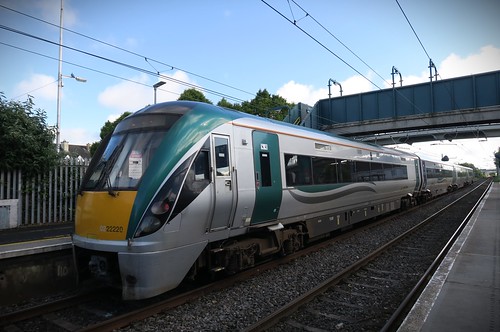Smart Dart

Image by Cityswift 123
DART upgrade
Upgrade from the usual DART to work this morning due to a bridge strike at Grand Canal Dock.
The 07.54 comutter service from Grand Canal Dock to Drogheda, usually non stop from Connolly to Howth Junction served all northbound stations due to DART distuption. #irishrail #train #upgrade #irishyoghurts #kefir #dart #iarnodeireann
Iarnród Éireann (Irish Rail) 22000 Class InterCity Railcar (ICR), built by Hyundai Rotem, as there’s no specific "Class 29" associated with Irish Rail in available records. The 22000 Class, often referred to as the ICR, is a diesel multiple unit (DMU) that has been a cornerstone of Irish Rail’s InterCity and commuter services since its introduction in 2007.
The 22000 Class ICR was manufactured by Hyundai Rotem of South Korea, in partnership with Mitsui of Japan and Tokyu Car Corporation, which supplied the bogies, at a cost of approximately €400 million. The fleet was introduced to replace older locomotive-hauled carriages, such as the British Rail Mark 2 and Mark 3, and began service between 2007 and 2011. The initial order of 120 vehicles was expanded to 234 by 2008, with an additional 41 intermediate cars ordered in 2019 for delivery between 2021 and 2023. These railcars operate at a maximum speed of 160 km/h (100 mph) and serve most InterCity routes from Dublin (except Dublin-Cork and Dublin-Belfast, which also use other rolling stock) and commuter services to destinations like Portlaoise, Carlow, Athlone, Dundalk, Kildare, Longford, and Mallow. The fleet is configured in 3, 4, and 5-car sets to provide flexibility for varying passenger demands, with a total of 63 sets (28 three-car, 25 four-car, and 10 five-car) as of recent updates.
The 22000 Class features modern amenities designed for passenger comfort, including air-conditioning, LED destination signs, power sockets, and USB ports added during a 2019-2022 refurbishment that also replaced cloth seats with leather to reduce maintenance costs. Each train includes a multipurpose area with flip-up seats and bicycle storage, though the newer intermediate cars lack toilets, as existing carriages already have them. The railcars are equipped with open gangways for easy movement between coaches, fixed tables, and non-reclining seats in standard class. Catering services, once provided by Rail Gourmet, were discontinued in 2020, but a contactless-only catering service was introduced on the Dublin-Cork route in 2023. The trains have faced challenges, including corrosion damage on two units (22010 and 22011) during delivery, which were replaced by Rotem, and incidents like deer strikes and a collision with a timber train in 2025, causing minor to significant damage to specific units.
Operationally, the 22000 Class has transformed Irish Rail’s network by enabling faster, more frequent services compared to the older locomotive-hauled stock. For example, Dublin to Galway and Limerick journeys now take around 2 hours 45 minutes, with improved timetables since the ICR’s introduction. The railcars are maintained at the Portlaoise Traincare Depot, where Irish Rail provided access for detailed modeling by Irish Railway Models for a 2024 OO-gauge release. Efforts to improve fuel efficiency include engine shutdown modifications in 2008 and a trial of ZF transmissions in 2018, targeting up to 19% fuel savings. The 22000 Class remains a critical asset for Irish Rail, supporting both InterCity and commuter services while aligning with plans for network expansion under the National Development Plan 2021-2030.


